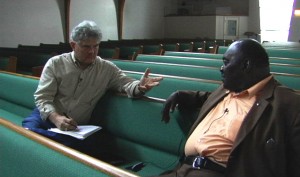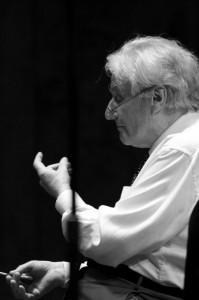Ch-ch-Changes
 Just gonna have to be a different man
Just gonna have to be a different man
Time may change me
But I can’t trace time
— David Bowie
Most things change, by entrophy if nothing else. Governments evolve and change. Even the military, that bastion of conservatism changes. The generals in World War I who watched the flower of the youth of several nations die senselessly before the machine gun were operating under principles set in place before Napoleon. But even they were forced to change with the onset of World War II.
Education, however, does not change. Yes, there are differences between modern education and the original Socratic method, but Socrates never had an Introduction to Mass Communications class of 300. And my smallest classes do, indeed, revert back to the Socratic question/answer method.
In fact, education fights change. Professors fight fierce rear-guard scorched earth actions against change. (And the higher the ranking of the professor, the greater the resistance to change.) Alumni withhold donations over perceived changes. Administrations move at a glacial speed, even when a change is clearly in everybody’s best interests.
Seymour Papert’s thoughtful paper “Why School Reform is Impossible” is a reasoned response to the this age-old question. His observation that even modern technology, which has changed all other facets of modern life, has failed to impact education (secondary and college), save for tiny pockets of enlightenment here and there is perhaps the most chilling section of the essay.
Sure, professors and students now communicate by e-mail, professors use Blackboard for grades and attendance, some even link edited film clips to Power Point presentations. But those are superficial changes at best.
The basic methods of teaching (lecturing and testing) are virtually unchanged for hundreds of years. Meanwhile, our students drop out, tune out, and grow more cynical, even as our old school methods of conveying information grow more irrelevant. David Bowie again:
I watch the ripples change their size
But never leave the stream
Of warm impermanence and
So the days float through my eyes
But still the days seem the same
And these children that you spit on
As they try to change their worlds
Are immune to your consultations
They’re quite aware of what they’re going through
When we allow them to bring their laptops to class, students check their e-mail and Facebook pages, surf the Internet, or play games. I can see the glow of their cellphones as they text each other, pretending that they’re listening. Although lately, some have quit pretending…
Still, Why Education Reform is Impossible implies that the revolution will occur. In fact, it is occuring now. The difference is that this revolution is occuring — like the very best revolutions always do — from the bottom up.
We’re in a period of transition — the first waves of students who have mastered these new technologies are flooding our educational systems. When they’ve moved on into their careers — and hopefully some of them will choose K-12 and college education — they’ll bring with them the technology skills many of us current lack. Old timers will fight them. School boards won’t support them. Parents will complain about them. But the sheer weight of numbers will overcome all obstacles. Technologically aware and adept teachers will teach technologically aware and adept students … and things will change.
It’s happening now in the Journalism Department. We’re scrambling to keep up with students who already know (or who can quickly master) Dream Weaver, End Design, Adobe, and digital editing. We’re having to learn how to challenge these kids, how to assess them, how to incorporate what they know and want to know into our teaching methods on the fly. And the results, I’m happy to say, aren’t half bad.
I have colleagues in other departments who say that’s all well and good for “the trades” (as some of the derisively call departments like Journalism, FDM, Consumer Science), but that these changes will NEVER infiltrate their “pure” academics, the humanities, philosophy, math, Latin, Great Texts. They tell me that a REAL education is not possible utilizing these tools and advances.
Fine. Or, as my students say, “Whatever.”
The Fourth Wave. The Fifth Wave. The Sixth Wave … but who is counting anymore? The kids are bringing it with them NOW.
And guess what? The kids are alright.
Oh, look out you rock ‘n rollers
Ch-ch-ch-ch-Changes
(Turn and face the strain)
Ch-ch-Changes
Pretty soon you’re gonna get a little older
Time may change me
But I can’t trace time
I said that time may change me
But I can’t trace time
 The recent passing of legendary professor Bob Reid sent a chill through those of us who love Baylor. It was a reminder, once again, of a day when great teachers ruled. Not researchers or writers or administrators. Teachers. Inspiring men and women who knew how to move mountains with their words and — what is much more difficult — knew how to move the hearts and minds of hormone-ridden 18-year-old boys.
The recent passing of legendary professor Bob Reid sent a chill through those of us who love Baylor. It was a reminder, once again, of a day when great teachers ruled. Not researchers or writers or administrators. Teachers. Inspiring men and women who knew how to move mountains with their words and — what is much more difficult — knew how to move the hearts and minds of hormone-ridden 18-year-old boys.







